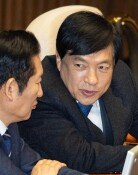Will She Be Frances Next President?
Will She Be Frances Next President?
Posted November. 18, 2006 04:17,
In France, debates are raging over on the issue of le président vs. la présidente.
Le président is a male noun that means president. There is a female form of this word, la présidente, but it is not used to mean president. The main issue of the dispute is whether or not to give the meaning president to la présidente.
The cause of such dispute is Ségolène Royal, member of the French National Assembly who was elected on November 16 as the Socialist Party candidate for the presidential election. People are arguing about what Royal should be called in the case that she is elected president. It is popular opinion that in order to emphasize the fact that she is a woman, la présidente should be used, and to emphasize the office of president, le président should be used. The fact that such a dispute is going on shows that the possibility of her election is indeed quite high.
Born as the fourth of eight children to a colonel in Dakar, Senegal in 1953, Royals life has been a never-ending battle against male chauvinism. Her father was a severely patriarchal man to the degree of thinking, The only thing for a woman to do is to bear children. Since she was a child, Royal fought for liberation from her fathers authority.
A graduate of École nationale d`administration (ENA)-
After achieving independence from her father, Ms. Royal chose the path of a politician. After graduating from college, she attended the ENA, an institution that trains senior officials. French Socialist Party leader François Hollande, who is currently her partner, and Prime Minister Dominique de Villepin were her classmates.
She entered the political world as special adviser to former president François Mitterrand. Holding the offices of Minister of Environment and Vice-Minister of Family and Childhood since 1992 during Mitterands term, she is said to have protected the value of the traditional family and contributed to the protection of children and expansion of womens rights. Her most important achievements include the adoption of maternity leave for men and the banning of child pornography.
Royal became more widely known when she was elected as the regional premier of Poitou-Charentes.
Contending for the victory with the sensitivity and affinity of a woman
The strengths of a woman boosted Royals popularity. She has four children with her partner, party leader François Hollande, with whom she lives with as civil partners without being traditionally married. The fact that Royal succeeded politically while being faithful to her role as a mother appealed to the public.
However, few thought of her as a presidential candidate until she announced her decision a year ago. The reason she was able to achieve such popularity in one year was because she filled the publics need for a new change.
Although a left-wing politician, she has not hesitated to show rightist opinions. She criticized the 35 hours of labor per week system, thought to be the most important achievement of the Socialist Party, saying, It isnt efficient, and even proposed sending juvenile delinquents to military institutions, a very right-wing opinion.
Traditional socialists have criticized such actions, saying, It makes the value of the Socialist Party fade. Competitors mocked her, saying She lured the public with her looks. As her popularity increased, news magazines, the popular press, and ladies magazines competitively used her as their cover model. Last summer, a picture of her in a bikini during her vacation was on the cover of a magazine.
However, all public surveys showed Ms. Royal at the top of the left-wing list. Because of the fact that she is the only contender for the ruling party, some are saying that Socialist Party supporters have no choice. Public attention is increasing regarding whether the revolution of calling the new president la présidente will actually happen.
gold@donga.com







